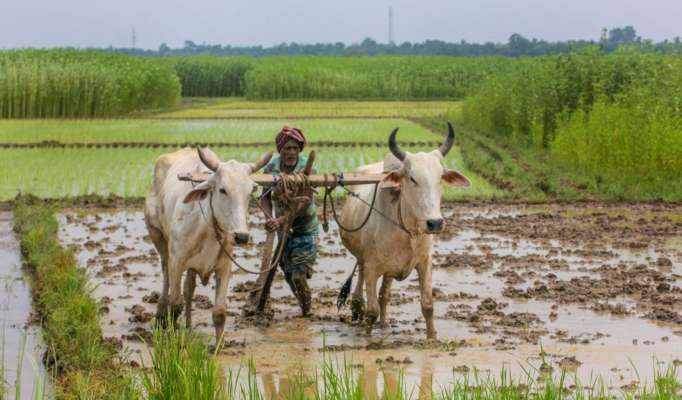 16-03-2020
16-03-2020
Farmers Owed Rs 3,000 Crore in Crop Insurance Claims 7 Months After Deadline

 Insurance Alertss
Insurance AlertssFarmers Owed Rs 3,000 Crore in Crop Insurance Claims 7 Months After Deadline
New Delhi: Farmers have not been paid Rs 3,001 crore worth of crop insurance claims seven months past the deadline date, according to information obtained by The Wire through an RTI application.
The data pertains to the 2018-19 season whose last harvest - the rabi season - ended in May 2019, almost 10 months ago. According to the Pradhan Mantri Fasal Bima Yojana (PMFBY) guidelines - which require claims to be settled within two months of final harvest - the claims ought to have been settled by the end of July.
In the RTI response, the ministry of agriculture and farmers' welfare has said that the estimated claims for the 2018-19 season were Rs 21,250 crore and Rs 18,249 crore has been paid as on February 27, 2020. So, 14%, or Rs 3,000 crore, worth of claims, have not been paid seven months after the deadline by which they should have been paid.
The gross premium collected by insurance companies in the 2018-19 season was Rs 25,822 crore, of which Rs 4,299 crore, or 16%, was paid by farmers. The rest - Rs 21,523 crore - has been paid - or will be paid, as some states have not paid the entire amount - by the Centre and the respective state. The maximum disbursement of claims has happened in Maharashtra where Rs 4,398 crore of the Rs 4,407 crore estimated claims have been paid. Gujarat has a 100% record of settling claims as Rs 2,777 crore of estimated claims have been settled.
The state with the maximum amount outstanding is Andhra Pradesh with Rs 875 crore worth of claims pending, out of the estimated claims of Rs 1,112 crore. Next is Madhya Pradesh, where not a single rupee has been paid and all the Rs 658 crore of estimated claims remain pending. Rajasthan and Jharkhand, with Rs 400 crore and Rs 370 crore, are among the other states with high amounts outstanding.
Delay in payment of claims has been a major problem with the PMFBY, as The Wire has reported several times (read here, here and here). The Centre attempted to address the problem. In September 2018, it announced that the insurance companies will have to pay 12% interest on the amount due if the claim is not paid within two months of the cut-off date.
The threat of penalty has not worked fully, the information obtained via RTI has revealed, as Rs 3,000 crore remain pending seven months after the deadline date even when the penalty mechanism was in place. It is also not yet clear if the insurance companies will end up paying the penalty. Insurance companies contend that the delay occurs when either the state or the centre delay in paying their share of premium, or when the state delays in providing data on crop loss. 'We are not interested in delaying claims. We know we have to pay. But if we don't get the premium amount, how can we pay claim?' said an official of a private insurance company.
The Centre argues that the delay occurs because states do not pay the premium amounts on time. 'The states are not making the payment of premium on time. That is the main problem with crop insurance. For example, Madhya Pradesh has not paid its dues for the 2018-19 season,' said an official in the union ministry of agriculture and farmers' welfare. States, on the other hand, argue that they are cash strapped. 'The Centre has been reducing Madhya Pradesh's share of taxes every year. And given the fiscal responsibility act, there is very little fiscal space to manage all the schemes. The Centre keeps passing on its responsibilities to the states,' said an officer in the agriculture ministry of Madhya Pradesh.
These three stakeholders jointly responsible for the implementation of the PMFBY have been voicing these concerns since the first season under the scheme in 2016. But have been unable to solve the problems as delays in settlement of claims continue. Farmers argue that the compensation for crop damage would be useful if it comes in time for the next sowing season. If a farmer suffers loss in the kharif season, the compensation should be paid in time for the money to be used as working capital for sowing during the rabi season.
When the PMFBY was launched in January 2016 by merging two existing crop insurance schemes, Prime Minister Narendra Modi had said that the scheme would 'bring about a major transformation in the lives of farmers'. That, however, has not happened and over the last two years, farmers have demanded that the scheme be made optional. Until recently, the scheme was mandatory for farmers who took loans under the formal credit system as premium amount was deducted from their loans.
In February this year, the Centre finally gave in to the demands and made the scheme voluntary. As Siraj Hussain has written for The Wire, this move could significantly scale down the scheme. Farmers who had opted for the scheme, i.e. those who had not taken loans but had opted for crop insurance (non-loanee farmers), were only 27% in 2017-18. That percentage has increased to 39% in kharif 2019. But most non-loanee farmers who have opted for crop insurance are from one state - Maharashtra - where a Bombay high court order means that premium cannot be deducted from the loan amount without consent of the farmer.
'The number of non-loanee farmers in Maharashtra is most probably an over estimate as loanee farmers have been listed as non-loanee to work around the court order,' said the agriculture ministry official. So, if Maharashtra is taken out of the equation, only 17% of the total farmers enrolled in PMFBY in Kharif 2019 are non-loanee raising questions on the scope of the scheme now that it has been made voluntary.
Source: The Wire
